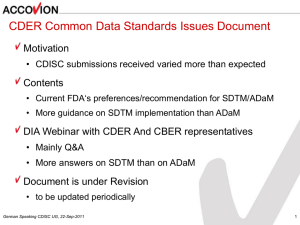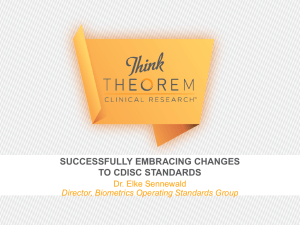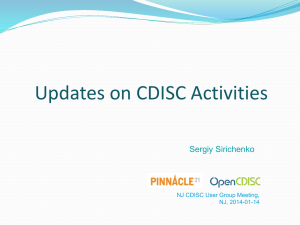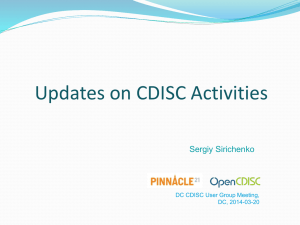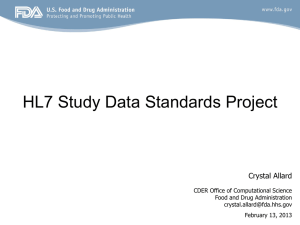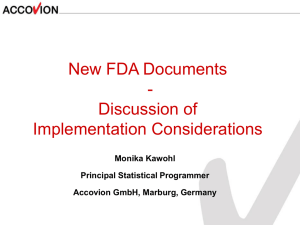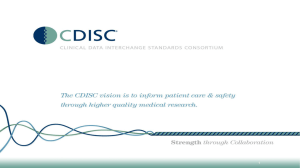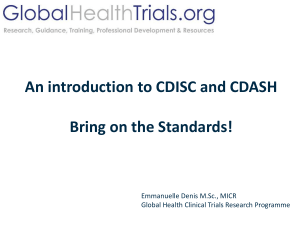Update-On-Standards-Validation-NJCUG-20130918
advertisement
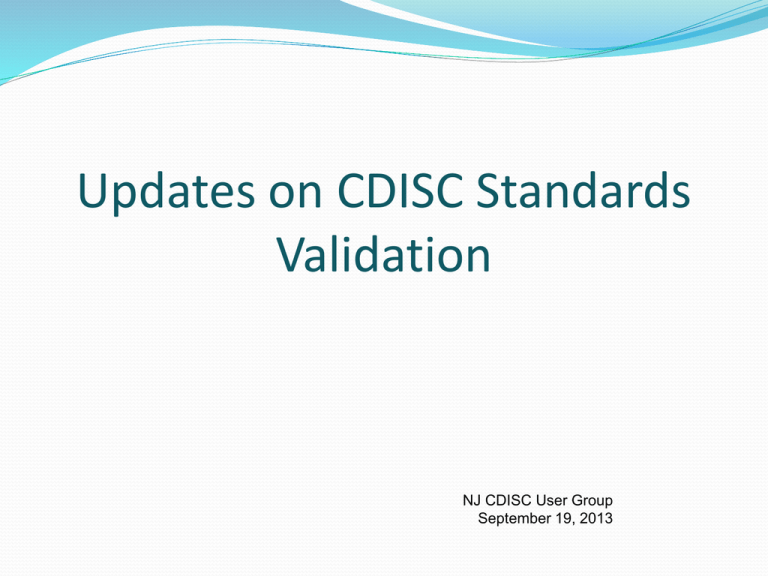
Updates on CDISC Standards Validation NJ CDISC User Group September 19, 2013 Topics CDISC standards validation initiative FDA update on SEND checks OpenCDISC v1.4.1 release OpenCDISC plans 2 CDISC validation projects Past ADaM validation checks Define.xml tool (schema only) CAB project Current plan (CDISC Intrachange 2013) Each CDISC development team will create a comprehensive list of business rules as a supplement to their standards Rationale Standards developers are the best experts in defining standards compliance requirements 3 CDISC ADaM Validation Checks First v1.0 was introduced in 2010-10 Current v1.2 was released on 2012-07 v1.2 includes 244 checks based on ADaM IG text ADSL and BDS data only Today the team is planning 2 iterations update existing checks and create new checks for ADAE, ADTTE data update checks after a new release of ADaM IG 4 Define.xml XML Schema Validation for Define.xml v1.0, 2009-11 Validator for Define.xml schema, 2009-12 Define.xml v2.0 includes many business rules embedded in standard specifications Today the team is working on detailed list of validation rules Executable specification will be published as Schematron 5 SDTM and SEND CAB/VP project, 2010 Evaluated compliance rules for SDTM/define.xml Reviewed checks across different vendors Current plan: Create comprehensive list of business rules as a supplement to new standards. E.g., SDTM v3.1.5, TA standards, etc. Challenges: Extra resources are needed Synchronization across teams Exact project scope and format are still under discussion 6 FDA’s validation rules for SEND data http://www.fda.gov/downloads/ForIndustry/DataStandards/StudyDataStandards/UCM367129.xlsx FDA Rule number MESSAGE DESCRIPTION DOMAINS SEVERITY Invalid variable name. Variable Only variable names listed in the SENDIG NONCLIN- names in the domain datasets Version 3.0 should be used in a domain 0006 should be compliant with the SEND dataset. standard ALL Error Invalid format for TEDUR. The The variable values for all timing variables NONCLIN- variable value values must conform must conform to the ISO 8601 0007 to the ISO 8601 international international standard standard TE Error Invalid format for RFSTDTC. The The variable values for all timing variables NONCLIN- variable value values must conform must conform to the ISO 8601 0008 to the ISO 8601 international international standard standard DM Error Invalid format for RFENDTC. The The variable values for all timing variables NONCLIN- variable value values must conform must conform to the ISO 8601 0009 to the ISO 8601 international international standard standard 7 DM Error Off-Topic: FDA’s Position Statement Study Data Standards for Regulatory Submissions FDA recognizes the investment made by sponsors over the past decade to develop the expertise and infrastructure to utilize Clinical Data Interchange Standards Consortium (CDISC)[1] standards for study data. The submission of standardized study data enhances a reviewer’s ability to more fully understand and characterize the efficacy and safety of a medical product. The Prescription Drug User Fee Act (PDUFA V)[2] Performance Goals state that FDA will develop guidance for industry on the use of CDISC data standards for the electronic submission of study data in applications. In the near future, FDA will publish guidance that will require study data in conformance to CDISC standards.[3] FDA envisions a semantically interoperable and sustainable submission environment that serves both regulated clinical research and health care. To this end, FDA will continue to research and evaluate, with its stakeholders, potential new approaches to current and emerging data standards. FDA does not foresee the replacement of CDISC standards for study data and will not implement new approaches without public input on the cost and utility of those approaches. September 13, 2013 http://www.fda.gov/ForIndustry/DataStandards/StudyDataStandards/ucm368613.htm 8 OpenCDISC v1.4.1 release, 2013-09-12 Bug fixes, enhancements, but no global changes Support for QS Terminology CDISC CT checks for extensible codelists are Informational and independent from user’s codelists in Define.xml SDTM 3.1.1 with all applicable checks Simplified, consistent and concise error messages and rule descriptions Excel report includes versions of Validator, CT, and MedDRA Enhancement to check definition syntax 9 SDTM Terminology New CDISC Control Terminology checks based on CT rather than on outdated SDTM IG assignments PKUNIT instead of UNIT in PC and PP domains PKPARM, SCTEST, etc. QS Terminology (CT0100-CT0255 checks) CT 1:1 consistency checks for paired variables TSPARM/TSPARMCD, EGTEST/EGTESTCD, etc. Terminology checks on non-extensible codelists were changed to Errors CT0001 (ACN), CT0002 (AESEV), CT0030 (RELTYPE), CT0059 (NY), etc. 10 Examples of SDTM checks “tuning” Rule SD0006 (“No baseline results”) was modified to exclude NOTASSGN subjects Rules SD0026 and SD0029 (“units are required”) were modified to exclude PH, SPGRAV and all Antibody lab tests Rule SD0037 (data vs. user’s codelist) was modified to exclude EGORRES variable Rule SD0069 (“No Disposition record for subject”) was modified to exclude SCRNFAIL and NOTASSGH subjects Rule SD1037 (“Missing value for --TOX, when --TOXGR is populated”) was modified to ignore records with TOXGR=0 11 SEND specific Fixed incorrect variable labels and order of variables in domains Several Check ID replacement for consistency with SDTM checks CT1003-> CT0088, CT1004->CT0089, etc. 12 ADaM Checks compliant with ADaM Validation Checks 1.2 Change all consistency rules to only run when primary variables are populated Remove AD1002 - Expected variable is not present within dataset. This is not a real rule. It was copied from SDTM logic Changes to improve label validation (AD0018) Addition of other rules interpreted from IG, which were not released by CDISC team 13 OpenCDISC v2.0 Date of release is planned for 2013Q4 Support for Define.xml v2.0 Metadata driven Specifications based on Define.xml v2.0 format Validation organized by functional area. E.g., - SDTM Compliance - Control Terminology - Metadata - Regulatory Specific - Data Quality 14 Example of metadata driven checks SD1117 “Duplicate records” in Findings domain The “generic” check uses 10 Key Variables USUBJID ESTCD --CAT --SCAT --METHOD --SPEC --DRVFL --EVAL VISITNUM --TPTNUM 15 Key variables as defined in SDTM IG IE STUYID, USUBJID, IETESTCD LB QS STUDYID, LBTESTCD, LBSPEC, VISITNUM, LBTPTREF, LBTPTNUM STUDYID, USUBJID, QSCAT, QSTESTCD, VISITNUM, QSTPTREF, QSTPTNUM DA STUDYID, USUBJID, DATESTCD, DADTC FA STUDYID, USUBJID, FAOBJ, VISITNUM, DATPTREF, FATPTNUM TU STUDYID, USUBJID, TULINKID, TUTESTCD, TUSTRESC, (TULOC, TULAT, TUDIR, TUMETHOD), TUEVAL, VISITNUM SDTM IG: “Note that the key variables shown in this table are examples only. A sponsor‘s actual key structure may16be different.” Combined Key variables STUDYID USUBJID POOLID --LNKID --SPID --TESTCD --OBJ --ORRES --CAT --SPEC --LOC --DIR --LAT --METHOD* --DRVFL* --ANTREG VISITNUM --DTC --ENDTC --TPTREF --TPTNUM 17 data * added by OpenCDISC as common cases in actual study The check implementation options Generic check with 20 key variables? Separate check for each domain? v.2.0 approach Take domain key variables from Standard metadata If define.xml is available, then utilize key variables provided in Study metadata Compare Standard and Study key variables 18 OpenCDISC Network More direct involvement in OpenCDISC project development process Beta testing Requirements input Additional resources for new projects Better support Face-to-face meetings with users Webinars Training and sharing users experience First meeting is before CDISC Interchange 2013 19 References CDISC ADaM resources http://www.cdisc.org/adam CDISC define.xml resources http://www.cdisc.org/define-xml FDA Study Data Standards Resources http://www.fda.gov/ForIndustry/DataStandards/StudyDataStandards/default.htm OpenCDISC http://www.opencdisc.org 20 Questions/Feedback Sergiy Sirichenko Max Kanevsky sergiy@opencdisc.org Mike DiGiantomasso mike@opencdisc.org max@opencdisc.org http://www.opencdisc.org/ 21
